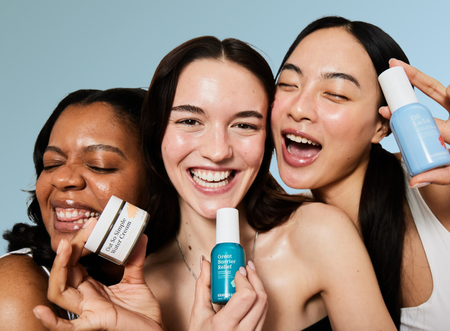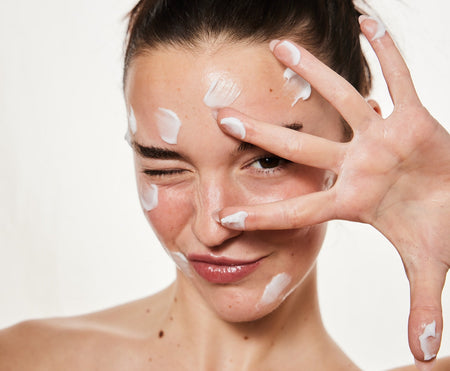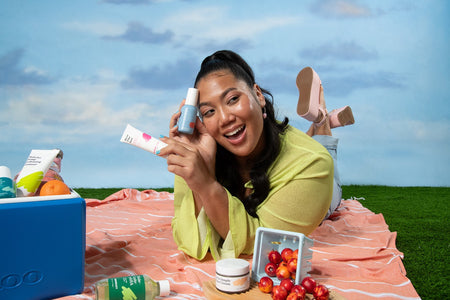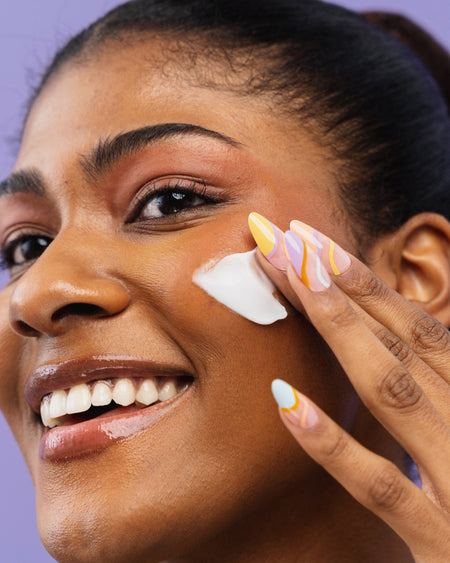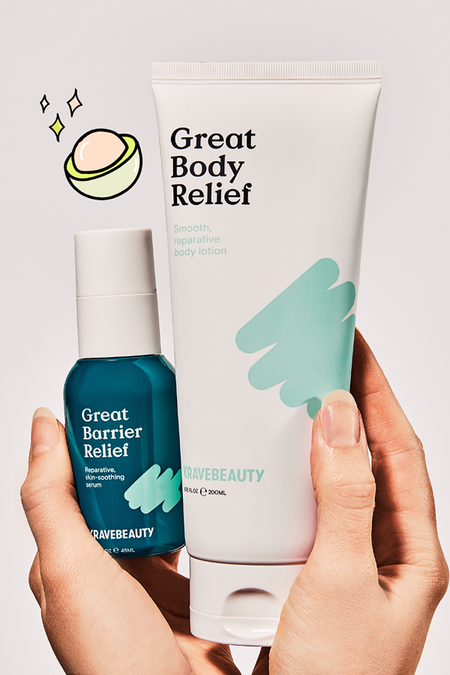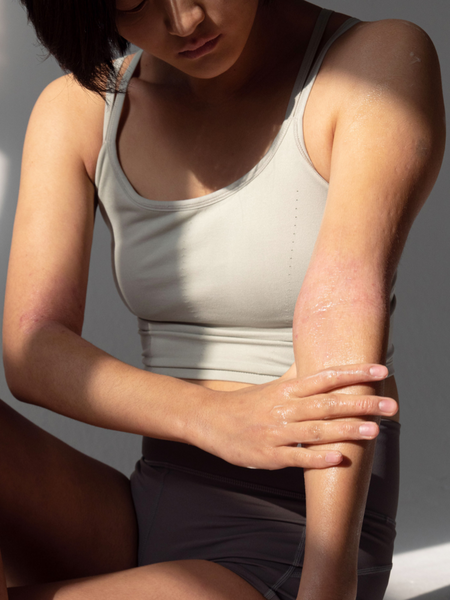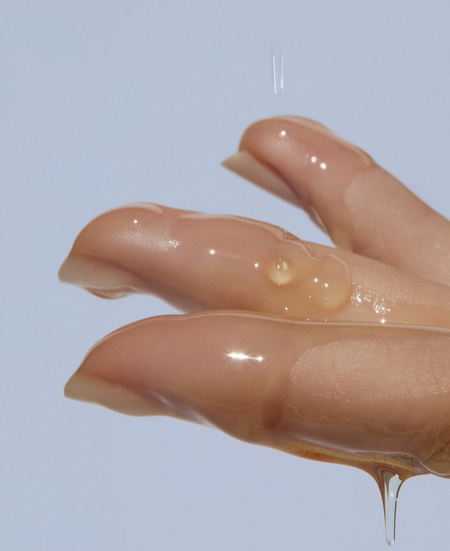Skin Barrier 101

We bet you've heard a lot about your skin barrier lately, right?
KraveBeauty has always challenged our community members to reject fads and trends and pay attention to what their skin needs instead. So when a new skin buzzword or miracle ingredient pops up, we usually chalk it up to be the next big fad. This is not one of those times.
We've been talking about the skin barrier since we launched our brand; in fact, our first product, Matcha Hemp Hydrating Cleanser, was intentionally designed to support your skin barrier. We believe anyone who has a skin barrier, AKA everyone, should know what it is, how it works, and how to take care of it.
The skin barrier is more than a buzzy word, it's an important part of maintaining your skin's (and body's) health. So if that sounds like something you care about, you'll appreciate our handy guide.
No fads, no bias, no marketing--just clear, researched advice from us to you.
Your Invisible Shield
So why all this sudden hype about the skin barrier? Well, the skin barrier has been around long before we started talking about it. You were born with a skin barrier as unique as you. Unlike your skin or your pores or a pimple, you can't see your skin barrier. Yet, it's been keeping you protected all your life.
Your skin barrier is like having your very own Secret Service detail: you may not know it's there, but it's always watching your back and protecting you against things that could harm you. If your skin barrier is doing its job right, it should stop threats that you don't even realize are there.
Too bad the cool nicknames aren't included.
What is Your Skin Barrier?
To understand your skin barrier, you should understand your skin. Imagine your skin is a house. A house has walls to keep it standing and openings like doors and windows to let things in and out. Think of your skin barrier as the brick walls that keep your house strong and protected.
The "bricks" are skin cells called corneocytes that make up the wall and they're held together by natural fats that act as the mortar glue. Like a brick wall of a house, your skin barrier sits on the outermost layer of skin. It's one of the few parts of your skin that interacts with the world, and its job is to be the first line of defense between your skin and the environment.
How Does Your Skin Barrier Work?
It's pretty simple: the skin barrier keeps the good stuff in and the bad stuff out.
The good stuff: water and nutrients. Your body needs these things to stay healthy and your skin barrier keeps them sealed in by preventing transepidermal water loss. Your skin barrier is lined with hydrophobic lipids, like ceramides, that act as a natural repellant to water. The water can't pass through them to escape so it stays put in the skin. Without your skin barrier, the water in your skin and body would evaporate, leaving you dangerously dehydrated. Nutrients like electrolytes and vitamins would also escape with the water, causing further damage. A brick wall is just as important for keeping those behind it safe.
The bad stuff: pollution, irritants, and pathogens. All of these things are everywhere, all the time. Your skin interacts with millions of pollution particles or bacteria every day, and your skin barrier is crucial for keeping them shut out. If they enter your skin, they can put your health at risk beyond just irritation. For example, your acid mantle, which is part of the skin barrier, acts as a buffer to harmful pathogens and helps prevent bacterial infections. Without your skin barrier, you would spend less time doing your skincare and a lot more time worrying about getting sick.

How Do I Know if My Skin Barrier is Damaged?
If something punched a hole in the side of your house, you wouldn't be so protected anymore. Knowing when your skin barrier is damaged can be the difference between healthy, protected skin and unhappy, vulnerable skin. And trust us, your skin barrier will let you know when it's unhappy.
Classic signs of a broken skin barrier include:
- Red or purple skin (irritation may appear purple or deep brown on deeper skin)
- Scaly dry patches
- Itchiness or stinging
- Oversensitivity
- Chronic breakouts
- Bacterial or fungal infections
- Loss of elasticity
If you see these signs, it may not automatically mean your barrier is broken, but it could be a sign that there's some damage. Your skin is smart and your skin barrier is strong, so if you're seeing recurring issues, there could be something wrong.

How Do You Repair + Maintain Your Skin Barrier?
If you notice signs of damage, act quickly. You don't want to risk continuing habits that can damage your skin barrier even more. If you listen and respond to your skin accordingly, it will do the rest.
Do's:
- Reach for products with barrier-supporting ingredients such as ceramides, cholesterol, and other healthy fats. Our Great Barrier Relief serum, packed with tamanu oil, safflower oil, rosehip oil, and niacinamide, is a crowd favorite for repairing damage in the skin barrier and calming signs of sensitivity.
- Get a balance of hydration and moisture; your skin needs both water and oil to maintain a healthy barrier.
- Use a cleanser with a pH close to your acid mantle's natural range of 5.0-6.0 so you don't mess with the acidity .
- Introduce products, especially actives and concentrates, slowly as to not cause a damaging reaction.
- If you see damage, simplify your routine and go back to basics: gentle cleanser, lipid-rich moisturizer, and sunscreen.
Don'ts:
- Over-exfoliate or overload your skin with acids and actives that can throw off your acid mantle's pH levels.
- Pick at your skin, especially when you're breaking out; releasing bacteria to the skin's surface can be damaging to the skin barrier.
- Skip the nutrition! Part of maintaining a healthy skin barrier is making sure you're getting nutrients and healthy fats in your diet too.
- Ignore the signs of a damaged barrier, always listen and learn from your skin!
Final Lessons
If you take away one thing from this guide, make sure it's this: you owe your skin barrier a lot so make sure you give back the love. Just like you would appreciate the house that keeps you safe, you should appreciate your skin barrier that does the same.





